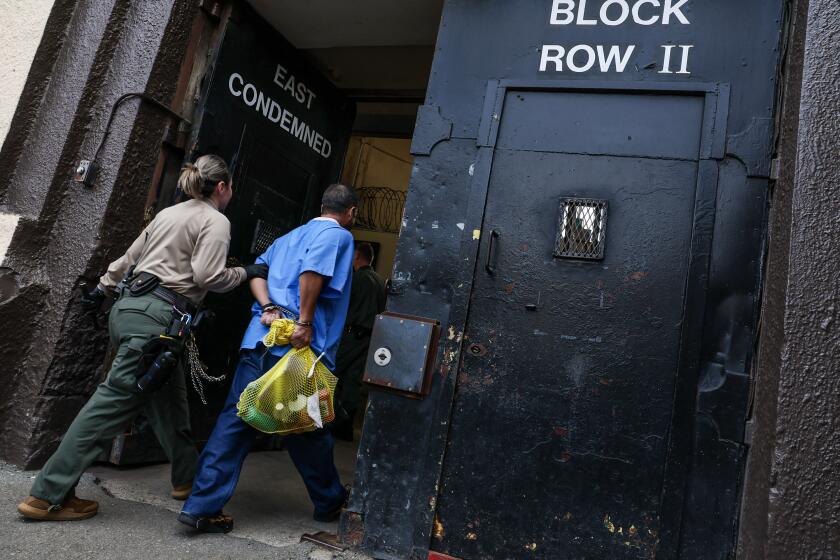Showdown in ‘Porterville’ : ‘Working Homeless’ May Be the Losers in Trabuco Water War
Ignacio Rodriguez Monrroy, his wife and son live without heat or electricity in a cramped, weatherworn trailer on Trabuco Highlands Ranch. But he considers himself lucky to have a home.
Like 35 other families living in the myriad shacks, trailers and abandoned boxcars on the ranch known as “Porterville” in Trabuco Canyon, it is the only home the 62-year-old nursery worker could afford.
Monrroy said he can do without electricity because he has a gasoline lamp. And he does not need heating because he has weatherproofed his trailer with scraps of wood from around the ranch.
There is one thing, however, Monrroy cannot live without: water.
“Water is the spirit of life,” he said in Spanish. “Nothing can live without water.”
But because of a dispute between Sam Porter, owner of the 300-acre ranch, and the Santa Ana Mountains County Water District, which supplies water to the ranch, Monrroy and the other low-income families living there may have their wellspring of life shut off.
After discovering in January that Porter had connected 14 of the trailers and shacks to his own water meter in violation of district rules, the water district board of directors issued an ultimatum: Porter must pay $33,600 to have meters installed on all 14 residences found in violation or water to the ranch would be cut off.
But Porter, himself a director on the water district board for the last two years, is fighting the order, charging that his fellow board members have a personal vendetta against him. He said the water district has cited him while ignoring other violators.
“This has nothing to do with the tenants,” Porter said. “They want me.”
But Charles Wall, vice president of the district’s board of directors, said: “No one
is nearly as blatantly (in violation) as he is. . . . I mean, he has a shantytown up there.”
Porter’s fellow board members have given him until Wednesday to present an acceptable plan to comply with the district’s rule. And while negotiations have been going on between Porter and the district, he said he may yet file a lawsuit seeking damages for selective prosecution.
Some of the tenants caught in the middle of the dispute said they would leave if the water is turned off, but a few said they would stay.
Hard to Live Without
“I can live anywhere if I have to,” said Wayne Chastain, who lives with his wife, Linda, and their 14-month-old daughter in a one-room shack on the ranch. “But we have a baby, and that makes it kind of hard to live without water. Water is one of those things you just can’t do without.”
Wayne and Linda Chastain said they could not afford an apartment or a house on his salary from doing odd jobs. If they had to leave Porterville--where rents range from $60 to $175 a month, including water--they would not be homeless, Wayne said. “But I would not have what I have now.”
Monrroy, who makes macrame purses and belts for extra income, said he would look for another home if his water is shut off.
The dispute pits Porter, a tough-talking 60-year-old cement contractor, against the four other board members representing the controversy-plagued water district. It began nearly two years ago when the district sent warnings to Porter and several other ranchers, notifying them that they were violating the one-meter-per-household rule. The district contended that several area ranchers provided water to laborers living in shacks and trailers on their ranches.
The issue was dropped after the water district ran into problems with the Local Agency Formation Commission, which, at one point, considered dissolving the district altogether.
Complaints From Landowners
In April, 1987, LAFCO heard complaints from landowners and developers who said that the Santa Ana Mountains County Water District was not providing long-range plans to provide water for the developing area. There also were accusations that the district used its power to limit development by favoring agriculture over housing, and some water district customers asked the commission to let them get their water service from a neighboring water district.
After a hearing on the complaints, LAFCO permitted two major landowners to withdraw more than 1,000 acres of land from the water district’s sphere of influence.
Porter’s violations were reintroduced to the water district board in January after the district’s general manager, J. Fred Sims, came onto the ranch to investigate a water pressure problem reported by Porter. Sims said that while on the property, he saw 14 homes connected to Porter’s water meter.
Sims notified the board, which gave Porter 30 days to comply with the district’s rule of one meter per household.
Porter, who said he has allowed “the working homeless” to live on his ranch for the last nine years, contends that the board members are ignoring other violators and focusing on him because of his criticism of the board. He said they are hostile because he has accused them of exploiting their positions for their own benefit.
‘Maverick’ on the Board
Porter, who refers to himself as the “maverick” on the board of directors, said he has been in conflict with the other members since he joined the board in July, 1985. (Porter said he ran for the office, in part, because of the earlier effort to enforce the one-meter-per-household rule, but also because of other problems he thought the district had.)
But Wall, the board vice president, said Porter is “unreasonable. . . . He is either sweet or is yelling and hollering.” Wall said the board has cited Porter because he is in “clear-cut violation.”
Gunther Bauer, president of the water board, denied Porter’s charges that he is being singled out. Bauer said five other area ranchers violating the rule have received warnings.
“I don’t want this whole thing blown out of proportion,” he said. There is a clear violation, he said, and “there is nothing vindictive involved.”
But Porter and his lawyer, Susan Trager, are not convinced.
“There is a question of selective enforcement here,” Trager told the board at its February meeting. In a recent interview, Trager said the other board members may be ignoring other violators and “prosecuting him (Porter) because they feel he is a director and the biggest violator.”
Henry Sakaida, manager of Sakaida Nursery, which borders Porter’s land, said, “This looks like a case of obvious selective enforcement.”
Sakaida--who supports Porter because many of his employees, including Monrroy, live at Porterville--has told the board that he has been guilty of the same violation for years. He added that he also has many laborers living in trailers and houses on his nursery but that the water district has not contacted him.
In a letter to the board, Sakaida wrote: “The district staff had to travel past numerous violations on my property to inspect Mr. Porter’s property; likewise, your water company’s employees visit my nursery on a daily basis to check my reservoir and other matters. No one from the district has contacted me about my violations.”
Bill Kadi, attorney for the district, said last week that the staff would begin to investigate Sakaida’s ranch for such violations. When told of the district’s plan to investigate him, Sakaida said he was not worried. “Porter is going to have to take this to court, and then we’ll have our say.”
At the board’s Feb. 18 meeting, Porter and Trager proposed a negotiation package that would call for a “phasing out” of Porterville within an undetermined time period.
But Bauer called the proposal “totally unacceptable,” adding, “How can the board tell people to follow the rules when the board members themselves are not following them?”
Wall said water district residents would not approve of such negotiations. “If they saw that we endorsed this piece of trash,” he said, holding up the proposal, “they would roast us alive.”
Many who live or work near Porter’s ranch know little about the water dispute but have heard of Porterville and its low-income residents.
Richard Dyer, supervising ranger at O’Neill Regional Park--across the street from Porterville--said he has not heard much about the water dispute but that occasionally he talks to law enforcement officers who ask for directions to the ranch. “It makes me wonder how many of the people up there are honest-to-goodness desperate people and how many are people running from the law,” he said.
Shayne Gallagher, who lives near the ranch on High Country Road, said she supports the ideals of the ranch. “We need more low-income homes in the area,” she said. “It may not be very presentable up there, but it’s something. These people are very poor.”
Gallagher said the tenants of the ranch have not caused any problems for her or her neighbors. “They seem to be just living there and not bothering anyone.” She said she also supports the idea of helping the homeless.
Meanwhile, residents of Porterville sit and wait while Porter, the district and several lawyers try to reach an agreement, one that will likely decide their future.
“There is nothing that we could say now, then, or whenever, that they would listen to,” Linda Chastain said. “They (water district board members) do not even acknowledge that we exist.”
Although the home Wayne Chastain built under a large oak tree is small, he is happy there. “I wouldn’t swap this and what I’ve got for those $2-million homes that those water district people live in,” he said.
Looking out over his land, Porter, whom the tenants call El Patron, said: “Look out there at all these squatters in trailers all along here. They have been spun out from the vortex of expensive city living.”
Porter, whose own barn-shaped home sits atop a hill, said Porterville was established because “it was my Christian-charitable obligation to provide people who work for a living a place to live.”
His wife, Jeanne, an English teacher at Joplin High School in Trabuco Canyon, said Porterville began nine years ago when a man who had been living in O’Neill Park came to them “hat in hand and asked if he could stay.”
She said that word soon spread about the ranch, which eventually became known as a refuge for the working homeless.
If Porterville loses its water, he said, the tenants will “just go someplace else to hide. They will just park in some commercial center and live out of their cars. It’s all they’ve got.”
More to Read
Start your day right
Sign up for Essential California for news, features and recommendations from the L.A. Times and beyond in your inbox six days a week.
You may occasionally receive promotional content from the Los Angeles Times.







